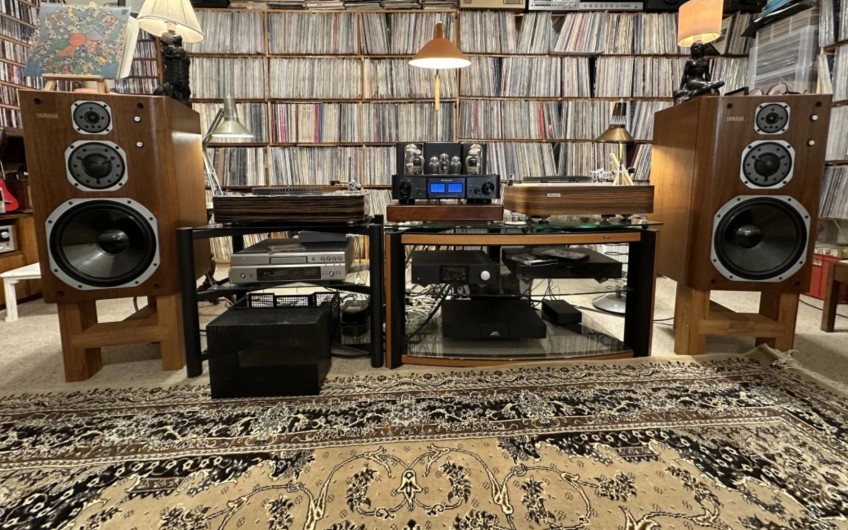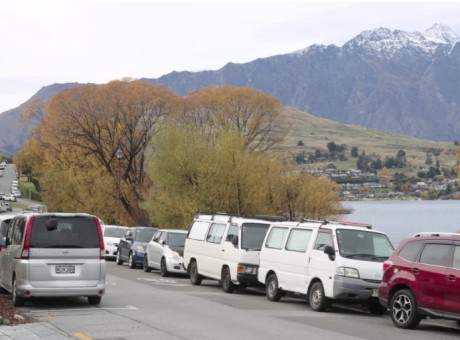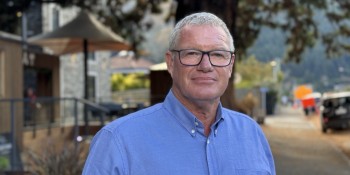At 50,000 and counting, is this NZ's biggest record collection?

A few weeks ago, Chris (last name withheld to protect identity) was flicking through his record collection when he came across a copy of Brain Drain, a 1989 album by the New York punk act Ramones. He noticed some markings on the cover. "There were scribbles all over it," he says. He wondered: "What is that?'"
Chris took a photo and sent it to a record-collecting friend. "I said, 'Is this a pisstake?'" His friend looked up the group's autographs online. "No," he replied. "That's been signed by the Ramones." According to recent sales figures, that could make his copy worth up to US$799 - about NZ$1300.
Chris didn't know he had that record. He doesn't know exactly what's in his collection because, after more than five decades of collecting, it's just too big.
"There are so many I can go flicking through [them] and go, 'Oh, I didn't know I had that,'" he says.
Most are stored in his "man cave," a shed out the back of his house where tens of thousands of records sit in cupboards and shelves, alongside couches, lamps and specialist audio equipment. Twelve more crates are stored in Chris' spare room, and even more in a separate dwelling where his daughter lives.
Occasionally he'll sell some, but that's usually to fund more records. So - as he scours sales bins, bids on bulk lots, and trawls websites - his collection keeps growing. Chris is always looking, always searching, for rarities. Yes, he admits it's an obsession.
"I'm not a hoarder," he says. "But I am a collector."
'It's not for the money'
Chris' collection is now bigger than most record stores. It could be the biggest in Aotearoa, but it's hard to tell. "It's really difficult to find people who want people to know about their collections," one Hamilton expert told me.
Rare vinyl collectors, he says, are precious about their stock. They rarely speak out or show them off on social media because they can be worth so much.
By his best estimate, Chris has approximately 50,000 records, and many are ultra-rare editions. One record dates back to 1910. He has 12 different pressings of The Beatles' White Album, and a rare Led Zeppelin record with the band's names misprinted. He recently sold an AC/DC seven-inch for $4500, but kept a back-up copy for himself.
Even though it may diminish their value, none stay in their original plastic wrap. All get played. "It's not for the money," he says, "otherwise I'd have flicked them off by now".
On Discogs, the vinyl cataloguing website, Chris says he's listed about 20% of his collection. Multiplying this estimate prices his collection somewhere between $500,000-$750,000. That's a figure too big for most insurers to take on. To do so, he'd need to photograph and price each record, a mammoth task. "I don't know if any insurers would want to carry that risk given the volatile market that is record collecting," he says.
So Chris has security cameras overseeing his collection at all times. When RNZ visits, he asks us not to reveal his last name, his partner's name, his previous career, or his location, anything that could reveal his collection to potential thieves. "I keep my head down," he says. He asks to be referred to as a "Pōneke-based collector".
He admits his collection can be overwhelming. "There's too much," he says. "I've got too many now." But he also says: "If I was to lose them all, it would be a tragedy to me." Only half a dozen people have ever stepped foot inside his man shed. Some of his friends have no idea he owns so many records. "A lot of people don't know I exist," he says.
'It's history, it's provenance'
This all started at the age of eight. Growing up in Lower Hutt in the 60s, Chris would visit a Stokes Valley electrical store and sift through their 10-cent record bins. He'd choose a few based on their covers and play them on his parents' radiogram while sitting at a piano. "I didn't necessarily know who the hell they were, but I'd try and play them," he says.
By the age of 17, his collection was "insignificant," he says. "It was nothing, a few 45s in a box," he says. One day, his older brother came home with Paul Simon's 1975 album Still Crazy After All These Years and Yes' 1977 album Going For the One. "I loved those albums," Chris says. His brother would hide them, but he'd find them and play them when he wasn't home.
Once he got his first job, the record-collecting bug bit Chris hard. He says a visit to Pōneke record store Slow Boat cemented it when a staff member explained why record prices were so varied. "They started telling me, 'This is a New Zealand record, there were only so many pressed, it's made by so-and-so,'" he says.
Something clicked. Chris realised there was more to records than other musical formats, more to them than the music embedded on them. Every record came with its own history, formed from the moment it was pressed. That's why Chris loves secondhand records. It's a piece of the past.
Sometimes, he'll find personalised notes or homemade art slipped into the packaging. He keeps it all. "There might be a cigarette stain on the sleeve," he says. To him, that's a good thing. He'll pop a plastic sleeve over it to protect it, just like all the others. "It may be a fault, but it's [history,] it's provenance."
And so, Chris began collecting. He's never stopped. Instead of swapping his records for CDs as many did in the 1990s, or getting an iPod and converting his collection to mp3s in the 2000s, or switching to streaming services in the 2010s, Chris has stuck with records, building his collection into what it has become.
Now, records just seem to show up on his doorstep. "People dump their entire collections and I buy them," he says. "They just fall into my lap."
'I want to find out what makes it so cool'
Chris seems to have emerged on the right side of history. Vinyl, a format many thought was destined for the dustbin, has rebounded in a huge way. Last year, vinyl sales had their biggest year since 1988. Just last week, the 2014 Travis Scott mixtape Days Before Rodeo hit No. 2 on the Billboard album charts, thanks largely to a vinyl repressing.
Fuelled by Covid shortages and the nostalgia boom, record stores around the country all say vinyl has become their top-selling format. Chris has seen this first-hand too: at a secondhand record fair in Upper Hutt recently, he saw twice as many collectors as were there last year. They were younger too. "They want the music, but they want it in a package," he says. "What a turnaround. What a change."
Chris has his own preferences. He's not big on classical music. He hasn't got a lot of 90s albums - although he admits there's a Limp Bizkit record sitting somewhere on his shelf. He likes collecting albums by New Zealand artists, because it's a piece of our own history. "They're special," he says.
But he also likes the thrill of the hunt. He mentions a Japanese online store he favours, but asks me not to reveal the name. Sometimes, he'll come across a record that gives him a vibe.
"When I see it, I know," he says. "[Something] makes it very rare or very hard to find and I want to listen to it. I want to find out what made it so cool at the time."
It happened recently when he came across a classical record sitting in a sale bin. "I was flicking through them, and here's (the New Zealand pianist) Judy Bailey," he says. "I thought, 'How do I know that name?" He took it home and played it. "I thought, 'This is really good. This is so cool.'"
Later, he looked the record up online and discovered it was rare, worth about $800. "I bought it for 50 cents," he says. He put it in a sleeve and found a place for it on his shelf.
'It's got smoothness and a little bit of sweetness to it'
Whenever Chris feels overwhelmed, wants to take a load off, or is ready for a break from a busy day, he heads outside and opens the door to his small shed at the back of his property.
There, he'll switch on his lamps, turn on his amp, and gaze around his room looking for a record to put on. But which one? "When I come in here, I'm like a goldfish," he says.
Is this NZ's largest record collection? Photo: Supplied
This, he says, is often the highlight of his day. "When I come out here it's like finding a bit of hokey pokey in my ice cream," he says. He pulls a Lana Del Rey record out of its sleeve. "This is the magic part of it."
He instructs me to lie back in a leather lounge chair as he drops the needle. Del Rey's song 'Did you know that there's a tunnel under Ocean Boulevard?' begins to play, swooping and soaring in ways I've never heard before. It's like she's performing in the room for an audience of two. "It's like honey," says Chris. "It's got smoothness and a little bit of sweetness to it."
Moments like these are why he does it, and why he can't stop. "There's a real joy in experiencing this. It's beautiful. It's more than just music ... it's something else that's there as well ..." He trails off, struggling to find the right words. "It's not hard to get emotionally involved in [this] ... you're just ... in it."
Chris admits his collection will never be finished. There's no one record that will complete it. "That's not the point," he says. "When's life complete? It's when you die." So what happens to all of it - the 50,000 records, the thousands of 45s, the collectible stereo equipment, the signed Ramones record - when he goes?
His family doesn't want to inherit it. They don't share his passion for vinyl. "There's little interest from the closest family in taking over the obsession," he says. Instead, he's told them to pass his records on, to find them a new owner.
There's one thing he's certain of: "They won't go short of someone wanting to give them a home."
* Chris Schulz is a freelance writer and the author of Boiler Room, an Aotearoa music newsletter






















